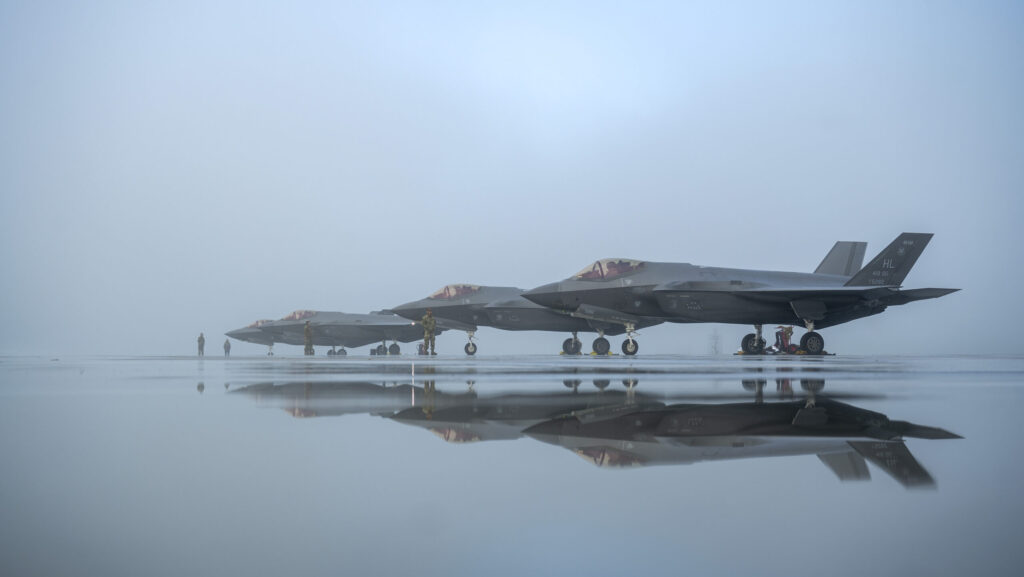JUST IN: 2025 Air Force Budget in Peril if Congress Doesn’t Pass 2024 Appropriation
Air Force photo
ARLINGTON, Virginia — The March 11 date for the Biden administration to submit its fiscal year 2025 budget request to Congress is fast approaching, yet Congress has yet to pass a 2024 budget, and that could devastate the Air Force’s 2025 modernization plans, the service’s secretary said.
Speaking at a panel discussion on reforming the defense budget process at the RAND Corp. Feb. 8, Secretary of the Air Force Frank Kendall said the service has learned to operate under continuing resolutions, but there is $5 billion of modernization funding for the service’s operational imperatives hanging in the balance. Plus, if Congress is unable to pass a 2024 budget, a sequestration-like clause would kick in from last year’s debt-ceiling deal that would result in a funding level of 2023’s budget minus 1 percent.
“I’m most concerned about the loss of that modernization money … that initial increment of operational imperative money,” he said. “But our buying power under a sequestration scenario, with a yearlong [continuing resolution] drops by about $13 billion, about 7 percent of our total budget for the Department of the Air Force,” he said.
That loss is exacerbated by the 5 percent raise the service is honoring despite the funding not being in place, and that money will further reduce buying power for modernization, he said.
On top of that, the fiscal year 2025 budget the department is finalizing could end up moot.
“The ’25 [budget] is based on ’24,” he said. “It’s based on the assumption that ’24 will pass, basically as intended. And all the indications from the Hill are that we’re going to get something that’s essentially the President’s budget, with whatever modifications that the committees have made.”
If the Air Force ends up with the worst-case of 2023 funding minus 1 percent, “we’ve got to do significant replanning; we’ve got to make some decisions we probably didn’t even contemplate as we’re building 2025,” which is about ready to go, he said. “It’s been held up for a couple of reasons. But the main reason is that we’re waiting for ’24 to pass.”
Kendall said he had just met with the Office of Management and Budget, “and I think right now the intent is to go ahead and submit it, whether ’24 passes or not. But if we end up getting another [continuing resolution], if we end up getting the continued threat of sequestration, ’25 will not be highly relevant to our reality, and we will have to go back and make some changes.”
After the panel, Kendall told National Defense the Air Force is not preparing a “worst-case scenario” alternative budget for 2025. “It would be a lot of work for one thing, and we’re counting on the Congress to do its job. I have asked my team to take a look at some risk mitigation we might be able to do. There’s not a ton of flexibility because so many of the accounts you kind of just got to keep spending. It’s going to be pretty devastating if you don’t get ’24 passed no matter what.”
During the panel, Kendall outlined some the steps the service is taking to mitigate the impact of the ongoing continuing resolution.
“One thing we don’t do is we don’t assume we’re going to be able to order a new contract in the first quarter of the fiscal year, and we build our planning that way,” he said. “We also do our best to take advantage of the lead time inherent in the process. So, getting contracts ready, interacting with industry.
“If you’ve got the funds, you can do some risk reduction, you do concept refinement, you try to do things to prepare so that when the trigger is pulled and you’ve got availability of funds, you can move very quickly to award contracts and get people moving forward,” he said.
Kendall praised Congress for passing the “quick-start initiative” he has championed that authorizes the services to begin up to $100 million worth of work on new programs before a budget is passed to allow some new starts to move forward during a continuing resolution.
“That’s a breakthrough to me; I’ve been after this for like 30 years,” he said. “We’re working right now to identify the first program. I’m not going to tell you what it is. But I hope to be able to talk about it very shortly.”
However, when the continuing resolution extends beyond the first quarter, and it is already halfway through the second quarter, the coping strategies wear out, he said.
“There are only a couple of contractors … I can think of that have been through the Defense Department that have been willing to make some bets on money becoming available,” he said. “And whether that’s going to turn out to be a good business practice for now is uncertain right now.”
Uncertainty was a word that came up often in the discussion.
“I’ve been talking to a lot of members and senators about this — nobody knows how this is going to come out right now,” he said. “We had a path we thought was clear to a supplemental, we thought we had a path to getting those passed. I have no idea what’s going to happen.”
Kendall told National Defense the damage is accumulating.
“We’re still planning on dropping the budget on [March 11] after the congressional deadline, so we’ll see,” he said. “It’s so strange up there right now that it looks like you got a deal, it looks like it’s going to go through, and then it gets blown up.”
Topics: Air Force News





















Discussion about this post